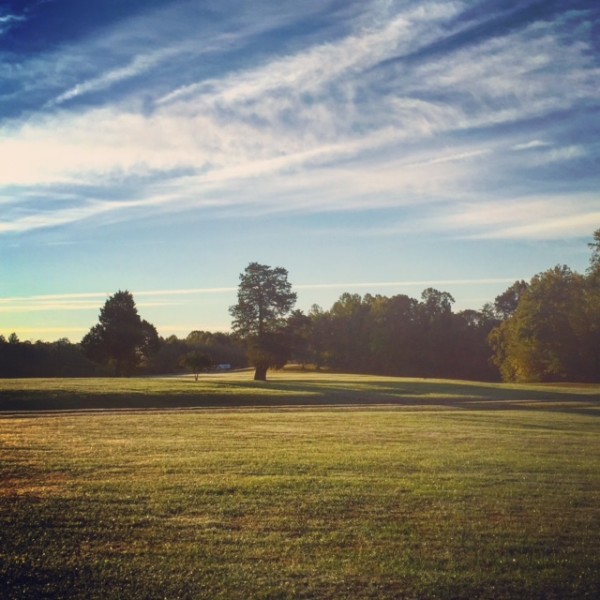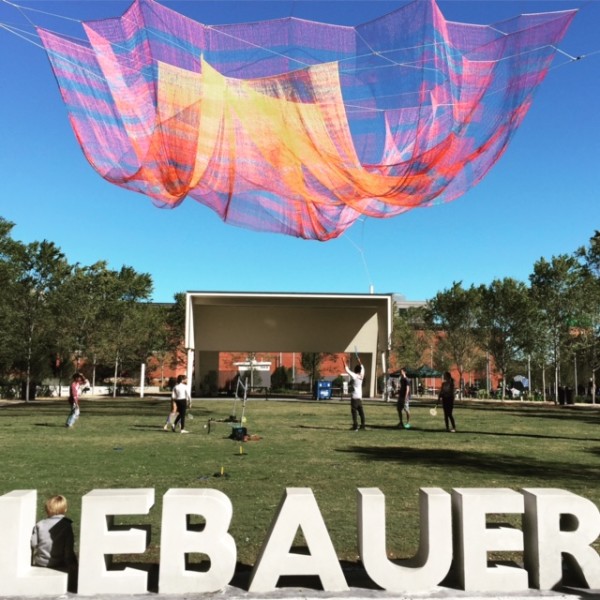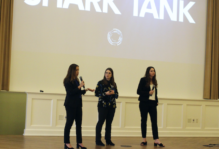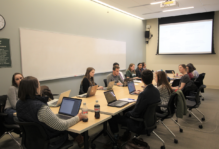Branching Out: Refugee Service in Greensboro, NC
College is a great time to serve. Though a demanding course schedule, part-time work, and extra curricular commitments can seem like a heavy burden, for many people, college is the most uncommitted time of your life. Additionally, service can bring new perspective and deeper meaning to the topics and causes you feel most passionately about in the classroom. And take it from a graduate assistant in the Cohen Career Center, there is also great résumé-building potential in volunteer and service work.
After seeing a call for applications in the “Student Happenings” newsletter, I decided to apply for a Branch Out alternative fall break trip through the Office of Community Engagement. While I had been looking for volunteer opportunities since starting the first year of my graduate program in August, my interest in this opportunity was piqued when I learned that one of the fall trips would be to Greensboro, NC where participants would have the opportunity to work with refugee and immigrant families. For the past several months, I’ve followed news about the refugee crisis in Syria and heard issues concerning immigration and refugee resettlement take a prominent role in presidential campaigns. I knew this trip would be an invaluable opportunity to get firsthand knowledge of what refugee resettlement looks like in the United States. Also, important detail: the trip was free. I couldn’t turn this down, so I applied and shortly thereafter learned I’d been selected to participate.
Then Hurricane Matthew came. In the week leading up the trip, there was quite a bit of uncertainty about whether or not this service opportunity would come to fruition. As forecasts showed Florida, Georgia, South Carolina, and North Carolina all in Matthew’s path, I was becoming less optimistic as the days went on. Early in the week, our trip leaders sent an email alerting the group that we were in a “wait and see” position until more reliable forecasts came later in the week. Fortunately, those late forecasts predicted Matthew’s impact in Greensboro to be minimal, so our trip was a go. I was both surprised and thrilled I wouldn’t have to spend my fall break waiting out wind and rain in my Williamsburg apartment.
The drive down to Greensboro was the only time we witnessed any of Hurricane Matthew’s force. Our packed van was pelted with rain for the entirety of our four-hour journey, but we made it to our destination in one piece and thankfully saw nothing but blue sky the rest of our time away. This, while hearing of the deadly flooding that had plagued coastal North Carolina on Saturday and Sunday.
Our first stop when we arrived in Greensboro was to an international grocery store to pick up food we’d be cooking during our trip. Before we left, our trip leaders let us know that we’d be budgeting $5 per day in food for each person on the trip. This was to make sure the rest of our budget was flexible (which allowed us to stop for Cook Out on the way back to Williamsburg), but also to live in solidarity with the individuals we’d be serving on the trip. Five dollars a day for food is roughly the budget a family living on the poverty line is forced to grapple with on a daily basis. The international grocery store had the best prices in the area for fruit and produce (we ate vegetarian for the four days because meat is expensive) and it also allowed us to get an inside look at a place many immigrant and refugee families would be likely to shop at in Greensboro.
There were some challenges. We needed sliced bread for sandwiches which was nowhere to be found in the store. Other items, including pesto, which we’d consider staples in an average “American” grocery chain, were also invisible. We were able to find these items we needed at a nearby Food Lion, but the process led to some insightful reflection. After we got to the conference center cabins we were staying in for the weekend and enjoyed a late meal of spaghetti squash, onions, sweet potatoes, and pesto, we shared what that shopping experience was like, and how our momentary frustration with not being able to find the items we needed in the grocery store must be a regular occurrence for immigrant and refugee families who scan the shelves of the stores we frequently shop at. It was a great first exercise in trying to enter into the lives of the individuals we came to serve.
Over the next several days we had many opportunities to learn about and serve the people of Greensboro. First, we visited Backpack Beginnings, a nonprofit that provides “food, comfort, and clothing” to children in need. Our role that morning was to help pack weekend food backpacks for children who might otherwise go hungry without the benefit of free and reduced food programs they have access to at school. While we didn’t get to see the children then, doing this important behind the scenes work at the warehouse really helped us bond as a group and think about the people we’d be serving and those we wouldn’t see during our short stay.
That first afternoon we had time to get acquainted with some of Greensboro, which we were surprised to see has undergone a lot of renovation and development in recent years. After visiting the Greensboro Historical Museum, we walked nearby to LeBauer Park, one of the most modern and amenity-filled city parks I’ve ever seen. In addition to a massive art installation hanging over an open green, the park had a children’s play area, ping-pong tables, cornhole, and putting greens, to name some of the various activities residents and visitors were engaged in throughout the park.
A final stop that day took us to one of several local bookstores scattered throughout the city, which aside from giving us a chance to refuel with coffee, allowed us to see the way small businesses in Greensboro are being supported.
The next and last two days of our short trip—Monday and Tuesday—saw us splitting time in the morning and afternoon between the New Arrivals Institute, which provides free services to help refugees resettle in Greensboro, and at University of North Carolina-Greensboro’s Center for New North Carolinians, which sponsors tutoring centers in housing areas where many refugee families live.
The first morning at NAI, after getting orientated and learning information about who refugees are, what brings them to Greensboro, and what services they need when they arrive, we had the chance to assist adult ESOL classes where refugees were learning the most basic language skills needed to survive in their new country. We learned many of these refugees wait five years or more before they’re accepted for resettlement and once they arrive, challenges remain. When I walked into the beginner ESOL class, I saw adult men and women from countries like the Democratic Republic of Congo, Burma, and Syria, struggling to learn how to count change. I proceeded to help the small group I was working with, which included mostly Congolese men and women, by counting off the number of pennies in a nickel and dime, then a dollar. You could see frustration, and tiredness in their eyes, from the counting maybe, but more likely from the trials of their lives that I would never know. Still, breaking through it all, was a fierce determination I rarely saw in my three years as a high school teacher. Suddenly, policy and politics mattered little. I wasn’t counting change anymore, I was holding the hand of a grown man old enough to be my father as he carefully drew the lines of an uppercase A. We were learning the alphabet.
That afternoon we spent time tutoring many of the children of these adult refugees, as well as immigrants. The children I encountered were joyful and bright, but some had trouble reading the instructions on their homework, or even finding time for their schoolwork when they were asked to watch siblings, do laundry, and make dinner, while their parents worked.
Each night after sharing dinner, our group of alternative breakers—students from various backgrounds, academic years, and major disciplines—shared openly about the impact this trip was having on each of us. We shared our hurt at the struggle these families are facing, but we also shared our admiration for their persistence and optimism. We also recognized the gifts of a tight-knit community that seeks ways to help lift each other up.
While our efforts didn’t solve the refugee or immigration crisis, those will persist for now, what we gained will leave a lasting mark on us and the families we served. What more could you want in a four-day weekend?






No comments.
Comments are currently closed. Comments are closed on all posts older than one year, and for those in our archive.